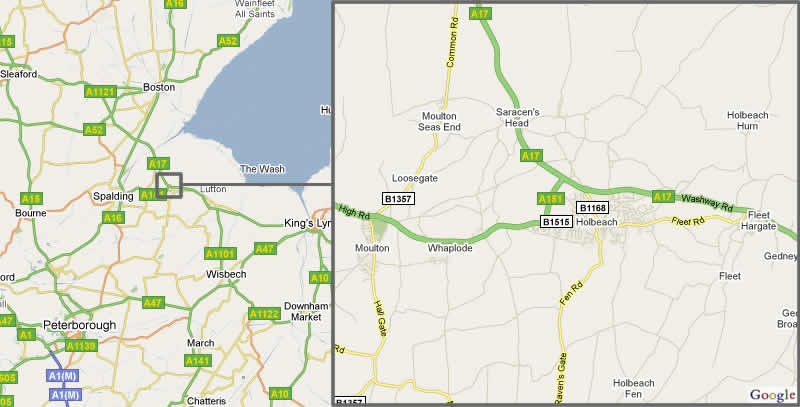
Holbeach, Lincolnshire
Holbeach in 1839 Holbeach is in the wapentake of Elloe, in the parts of Holland, 109 miles from London, a few miles to the right of the road to Boston. The parish comprehends an area of 20,240 acres, with a population in 1831 of 3,890, chiefly agricultural. The town is indifferently built and is in a low marshy district. The church is a large and handsome building, consisting of a nave, chancel, aisles, and square tower surmounted with an ornamented octangular spire. The market is held on Thursday. The living is a vicarage in the archdeaconry of Lincoln, of the clear yearly value of £702. There were in 1833 an endowed day-school with 101 children ; a day-school, partly supported by subscription, with 40 children; nine other day-schools with 349 children ; and three Sunday-schools with 275 children. ......... The town's market charter was awarded in 1252 to Thomas de Moulton, a local baron. The magnificent All Saints' Church was built in the 14th century and incorporated parts of de Moulton's ruined castle[citation needed]. The associated All Saints' Hospital, for a warden and fifteen poor persons, was founded by Sir John of Kirton, in 1351. It had ceased to exist before the suppression of chantries and hospitals. The renowned antiquarian William Stukeley reported his father removing the ruins from the site now occupied by the Chequers Inn. Until the beginning of the 19th century, the sea came to within two miles (3 km) of the town and there were severe floods recorded in the 13th and 16th centuries. The land drainage programmes of the 18th and 19th centuries moved the coastline of The Wash to nine miles (14 km) away, leaving Holbeach surrounded by more than 23,000 acres (93 km²) of reclaimed fertile agricultural land. The Spalding and Norwich Railway, (later incorperated in the Midland and Great Northern Joint Railway), opened Holbeach railway station in 1862. Like the rest of the M&GN route it closed to passengers in 1959 (before the Beeching Axe) and the line closed entirely in 1965. The 19th century also saw the building of several small churches, including a Weslyan and a Baptist chapel. The Prime Meridian of the world passes through the west of Holbeach |